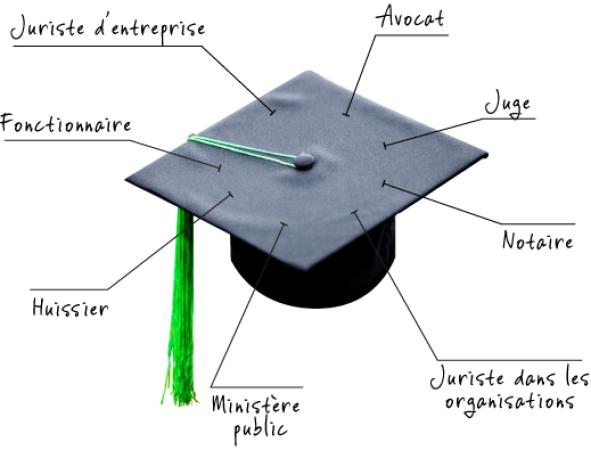Bachelor in Law (Evenings and Weekends Schedule)
-
Schedule
staggered hours
- ECTS Credits 180

The Bachelor of Law program comprises 180 credits spread over 3 annual blocks.
It is built around three objectives:
Acquire legal skills from the start of the curriculum and refine them later
From the very beginning of your course, you take legal teaching units (UE) that give you a clear vision of law studies and your future career as a lawyer. Alongside these legal courses, non-legal courses are offered, in subjects that enrich law and foster the open-mindedness and general culture that is the hallmark of any university student (history, philosophy, sociology, economics...).
Putting legal skills into practice
Throughout the bachelor's degree, and in a progressive way, you are led to put into practice the theoretical notions seen in lectures.
Exercise sessions consist of solving practical cases mobilizing the subjects seen which, although adapted to your level of study, are similar to those faced by lawyers, judges, in-house counsel, notaries, etc.
By writing assignments on a legal topic, you will learn to find the sources of the law (in codes, library books, properly targeted internet sources...), understand them and exploit them by developing a well-founded, argued and convincing legal reasoning.
Strengthen your knowledge of languages
Dutch and English are each the subject of a compulsory UE and benefit from specific pedagogical support.
Teaching methods
Effective time management, a pleasant and constructive group work climate, closeness to teachers, the development of critical skills and a concern for in-depth understanding of the subjects taught form the bedrock of the methods implemented.
Practically, this means:
- teaching that facilitates interaction and analysis of practical cases;
- real-life situations via mock trials, drafting of conclusions and consultations similar to those of lawyers;
- exercise and rehearsal sessions in small groups with documents to read and exercises to prepare;
- group question-and-answer sessions in the auditorium;
- individual or small-group coaching for writing legal assignments;
- attendances or interviews by appointment to answer your questions or address your learning difficulties;
- examination paper consultation sessions after each assessment session;
- a pedagogical coordinator who acts as your interface with the training players and oversees the progress of your program (feedback on lessons, individual follow-up for methodological questions and time management...);
- access to the full range of support services offered by UNamur to daytime students (the Cellule Médico-Psychologique [CMP], the Département Éducation et Technologie [DET] and the Cellule interfacultaire d'appui pédagogique [CIAP]...);
- the most comprehensive "course supports" possible, for the benefit, among others, of students who are unable to attend all courses;
- digital support: internet and intranet sites that centralize all available information (Bureau Virtuel de l'Etudiant [BVE]), a communication application (Teams) and a virtual campus (WebCampus) where each teacher defines, for his or her courses, the objectives, teaching and assessment methods and meeting arrangements, and offers his or her "course material" (syllabus, slide shows, documents, exam answer keys, discussion forum...).
- a choice of two examination dates (barring exceptions) scheduled in the first session for each teaching unit.

Duration and organization of studies
The Bachelor of Law program comprises 180 credits spread over 3 annual blocks
If you have a similar background (credits acquired in previous studies), you can obtain dispenses for certain subjectsor even enroll directly beyond the first 60-credit block.
For duly attested professional, academic, social or medical reasons, you can also opt for a reduction in their study program.
Course and examination timetables are organized in such a way that training can be compatible with the demands of working life.
A dozen hours of classes a week are spread over three evenings from 6pm to 9pm and Saturday mornings from 9am to 1pm and possibly from 2pm to 5pm. This program opens the right to paid educational leave.
After the baccalauréat: the master's degree
Studying on a staggered timetable gives access to the same degrees as those completed during the day (master's degree in law on a staggered timetable or during the day, master's degree in criminology, master's degree in political science...).
-
<unknown>
-
<unknown>
Code Name Staff Th.+Ex. Credits/Block 1 2 3 DRHDB141 Dutch (minimum level B1) Bulon Amélie 30h th. 5 DRHDB142 English for Legal Professionals (level B2) Hansel Aude 30h th. 5 DRHDB240 Dutch legal terminology (minimum level B2) Deville Guy 30h th. 5 -
<unknown>
Code Name Staff Th.+Ex. Credits/Block 1 2 3 EFASB254 Principles of economics Dejardin Marcus Woitrin François 30h th. 5 Soft skillsDRHDB120 History of Political Institutions ANDRE Mathias 30h th. 5 Soft skillsDRHDB121 Introduction to philosophy Ruffo de Bonneval de la Fare des Comtes de Sinopoli de Calabre Marie-Des-Neiges 30h th. 5 DRHDB220 Philosophy of law Montero Redondo Etienne 45h th. 7 EFASB321 Sociology Rigaux Natalie 45h th. 6
-
<unknown>
Code Name Staff Credits Hours/Quarter 1 2 Soft skillsEFASB210 Sources, principles and methods of law I Degrave Élise 5 30h th. DRHDB101 Constitutional law Wattier Stéphanie 9 60h th. Soft skillsDRHDB102 Sources, principles and methods of law II Defreyne Élise 4 30h th. Soft skillsDRHDB103 Civil liability law Colson Pauline 5 30h th. DRHDB104 Historic foundations of the private law Nolet de Brauwere van Steeland Augustin Rolain Mathieu 9 60h th. DRHDB105 Practical law exercises Vassart Ambre Kersmakers Sarah 3 20h th. -
<unknown>
Code Name Staff Credits Hours/Quarter 1 2 DRHDB141 Dutch (minimum level B1) Bulon Amélie 5 30h th. DRHDB142 English for Legal Professionals (level B2) Hansel Aude 5 30h th. -
<unknown>
Code Name Staff Credits Hours/Quarter 1 2 EFASB254 Principles of economics Dejardin Marcus Woitrin François 5 30h th. Soft skillsDRHDB120 History of Political Institutions ANDRE Mathias 5 30h th. Soft skillsDRHDB121 Introduction to philosophy Ruffo de Bonneval de la Fare des Comtes de Sinopoli de Calabre Marie-Des-Neiges 5 30h th.
-
<unknown>
Code Name Staff Credits Hours/Quarter 1 2 Soft skillsDRHDB201 Criminal law and procedure Delhaise Élise Basecqz Nathalie 12 75h th. Soft skillsDRHDB203 Law of obligations and contracts George Florence Vanstechelman Emilie 12 75h th. DRHDB204 Family law Mathieu Géraldine 7 45h th. DRHDB205 Methodology and law work Wattier Stéphanie 6 15h th. + 15h ex. 30h ex. DRHDB206 Practical legal exercises Marr Coralie Vanstechelman Emilie 5 12h th. 8h th. -
<unknown>
Code Name Staff Credits Hours/Quarter 1 2 DRHDB240 Dutch legal terminology (minimum level B2) Deville Guy 5 30h th. -
<unknown>
Code Name Staff Credits Hours/Quarter 1 2 DRHDB220 Philosophy of law Montero Redondo Etienne 7 45h th. EFASB321 Sociology Rigaux Natalie 6 45h th.
-
<unknown>
Code Name Staff Credits Hours/Quarter 1 2 DRHDB307 European Union law De Streel Alexandre Defreyne Élise 6 30h th. DRHDB301 Social law Flohimont Valérie 5 30h th. DRHDB302 Public liberties Wattier Stéphanie 5 30h th. DRHDB303 Principles of private judicial law Delvaux Marie-Amélie 5 30h th. DRHDB304 Practical law exercises Vassart Ambre Lombaerd Bastien 7 12h th. 8h th. Soft skillsDRHDB305 End of cycle work Rolain Mathieu 10 Soft skillsEFASB311 Economic law Jacquemin Hervé Hubin Jean-Benoît 8 45h th. DRHDB306 Public and administrative law Nihoul Marc Cuvelier Benoit XAVIER François 8 45h th. DRHDB313 Property Law Lachapelle Amélie Roussieau Candice Vandendries Alexander 3 30h th. DRHDB316 Intellectual Property Rights Michaux Benoît 3 30h th.
Les métiers des juristes

Legal professions
A constantly changing profession
Legal professions are evolving. It's no longer just a matter of intervening in litigation to defend a party or settle a dispute. Lawyers are also the advisors who prevent conflict by scrutinizing the applicable legislation or finalizing a contractual approach. Increasingly, they are called upon to intervene in non-judicial dispute resolution procedures, such as mediation.
Another notable development is internationalization. More and more cases have a foreign element, or are subject to supranational law such as European Union law. Finally, the development of information technologies is changing the day-to-day work of lawyers, while opening up new fields of specialization within the law.
The omnipresence of law in social and economic life explains the diversity of career opportunities open to legal professionals.
The professions of the lawyer
Lawyers are versatile professionals. The functions described here represent the core of the legal profession, but the list of outlets is far from exhaustive.
The judiciary
Magistrates are appointed for life by the King. There are two categories among them, the public prosecutor and the judges.
The Public Prosecutor's Office
Public prosecutors (known as "auditeurs" in first-degree labor courts) and their substitutes, grouped together in the Public Prosecutor's Office (also known as "the standing magistracy" or "the public prosecutor's office"), are in charge of public order. These magistrates prosecute offenders, coordinate police investigations, summon defendants to court and ensure that sentences are carried out. They intervene in economic and financial matters, environmental issues, computer crime, youth protection, social legislation offences... and of course in common law cases (traffic, vice, theft, assault...).
The public prosecutor may also be called upon to advise the court on the appropriate resolution of the dispute, in family matters, labor or social security law or in certain commercial cases.
Judges
Judges (also known as the "magistrature assise" or "the bench") are responsible for adjudicating disputes between individuals (in civil or social law matters) and judging those prosecuted for offenses (in criminal matters). Judges are appointed to various courts and tribunals, including justices of the peace, police courts, courts of first instance, labor courts, commercial courts, courts of appeal, labor courts and the Court of Cassation. Increasingly, judges are also playing a conciliatory role. Outside their hearings, judges study their cases, carry out the appropriate research and draft their judgments. Most judges are specialized. For example, police court judges mainly settle disputes relating to traffic offences and compensation for the consequences of road accidents; labor courts have jurisdiction over disputes between employers and workers, or in matters of safety and social welfare; justices of the peace hear rental disputes, relations between neighbors, and the protection of the mentally ill, among other matters; the family court has jurisdiction to settle family disputes and ensure the protection of children.
To become a magistrate, the main routes are, on the one hand, the competitive examination for admission to the judicial internship (followed by a 24-month internship) for those presenting at least two years' experience in a legal profession, and on the other hand the professional aptitude examination (allowing immediate appointment) for those demonstrating at least five years' experience in a legal profession to become a member of the public prosecutor's office and at least ten years to become a judge.
Notaries
The mission of notaries is to avoid conflicts between people wishing to reach agreements in the fields of real estate (purchase/sale of property, loans...), family (marriage contracts, gifts, inheritance...) and business (incorporation of companies, mergers...). They listen, advise and give opinions. They draw up authentic deeds that record agreements in writing, in a form that is legally unassailable. To embark on a career as a notary, you need, among other things, to pass a master's degree specializing in notarial practice and complete a three-year internship with an appointed notary.
Lawyers
Lawyers are self-employed individuals charged with advising clients facing legal problems in their private or professional lives, in strict compliance with legislation and ethical rules. Lawyers can assist their clients from the conception and launch of a project (drafting opinions and contracts) through to the various stages of dispute resolution (negotiation, mediation, legal proceedings). Their tasks are varied: researching legislation, case law and doctrine, drafting numerous written documents (letters, conclusions), organizing conciliation meetings, taking part in expert appraisals, pleadings... The lawyer's profession sometimes presents faces that are less familiar to the general public. For example, it is often lawyers who act as bankruptcy trustees, liquidators of a vacant estate, debt mediators, or administrators of the assets of vulnerable persons...
Lawyers newly admitted to the Bar must complete a three-year internship with an experienced lawyer before they can join the roll of the Ordre and practice the profession on their own. Many lawyers, however, choose to create or join associations, which in particular enables them to offer more specialized and diversified services.
Bailiffs
Bailiffs are public officers who intervene at various stages of legal proceedings. They communicate procedural documents to litigants (summonses, judgments, etc.). They are also responsible for enforcing court decisions, possibly through seizure. They draw up statements of facts (adultery, certain products on offer, unauthorized use of a brand name on a website, etc.). Their image is unfairly negative. In reality, they can play a conciliatory role, guaranteeing equal treatment for those subject to the law, while respecting everyone's rights. Law graduates can become bailiffs after two years' training and passing a competitive examination. After five years, they can then apply for a
vacant position as a "titular" bailiff.
Lawyers in public and private organizations
Company lawyers
Companies in general (industry, banking, insurance, telecommunications...) employ many lawyers in their various departments (human resources management, litigation, regulations...). Only members of the Institut des juristes d'entreprise can hold the corresponding title. These specialists are consulted on a daily basis by their employers on all legal issues (commercial, tax, environmental, social, etc.). For example, they advise on drafting and negotiating contracts. They also intervene in the event of litigation, although they do not represent the company in court, as they are not lawyers. Finally, they guarantee the legality of the various decision-making procedures within the company (they prepare boards of directors, for example).
Officials
In public services at federal, regional, community, provincial or municipal level (federal public services - SPF, CPAS, ONEM, Forem...), lawyers prepare opinions for managers on matters specific to their administration, focusing on the legal aspects. They play an active role in the preparation of legislative and regulatory texts.
Lawyers in organizations
Depending on their specialties, lawyers are also invaluable advisors in the non-commercial world and in associations (mutual societies, trade unions, consumer associations...), as well as in international organizations (European Commission, UN, International Court of Justice...).
The police
Frequent outlets for lawyers include the police, both in operational (investigations) and administrative settings.
Research and teaching
Some law graduates pursue a research activity in Belgium or abroad. Universities and public funds (e.g. FNRS) finance the completion of a doctorate (usually four years). Alongside other forms of fundamental legal research, "applied" research is generally based on partnerships with companies or public institutions that wish to develop new products or services and have questions about the legal framework. For example, what legal constraints need to be taken into account when setting up an internet sales service, what rules apply to the use of artificial intelligence by the judicial system?
Finally, some lawyers teach in high schools, in higher education or in the world of continuing education.